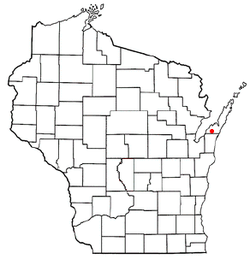Brussels, Wisconsin
| Brussels, Wisconsin | |
|---|---|
| Town | |
|
Looking east at Brussels on WIS 57 | |
 Location of Brussels, Wisconsin | |
| Coordinates: 44°43′54″N 87°34′45″W / 44.73167°N 87.57917°W | |
| Country | United States |
| State | Wisconsin |
| County | Door |
| Area | |
| • Total | 36.1 sq mi (93.6 km2) |
| • Land | 36.1 sq mi (93.6 km2) |
| • Water | 0.0 sq mi (0.0 km2) |
| Elevation[1] | 722 ft (220 m) |
| Population (2000) | |
| • Total | 1,112 |
| • Density | 30.8/sq mi (11.9/km2) |
| Time zone | Central (CST) (UTC-6) |
| • Summer (DST) | CDT (UTC-5) |
| Area code(s) | 920 |
| FIPS code | 55-10700[2] |
| GNIS feature ID | 1582880[1] |
| Website | http://www.townofbrussels.com/ |
Brussels is a town in Door County, Wisconsin, United States. The population was 1,112 at the 2000 census. The unincorporated communities of Brussels and Kolberg are located in the town. The unincorporated community of Rosiere is also located partially in the town.
History
Brussels, a civil town in Door County was created on November 12, 1858.
The largest Belgian-American settlement in the United States is located in portions of Brown, Kewaunee, and Door counties in Wisconsin, adjacent to the waters of Green Bay. Walloons settled the region in the 1850s and their descendants still constitute a high proportion of the population. A variety of elements attests to the Belgian-American presence: place names (Brussels, Namur, Rosiere, Luxemburg), the Walloon language, surnames, foods (booyah, trippe, and jutt), the Kerrniss harvest festival, and especially architecture. Many of the original wooden structures of the Belgian Americans were destroyed in a firestorm that swept across southern Door County in October 1871. A few stone houses made of local dolomite survived. More common are 1880s red brick houses, distinguished by modest size and gable-end, bull's-eye windows. Some houses have detached summer kitchens with bake ovens appended to the rear. And the Belgians, many of them devout Catholics, also erected small roadside votive chapels like those in their homeland. (source: Wisconsin Historical Society)
Most Belgian-American towns
Brussels, Wisconsin is the third-most Belgian-American community in the United States, by proportion of residents.[3][4]
- 1) Union, Door County, Wisconsin: 49%
- 2) Red River, Wisconsin (Kewaunee County) : 47%
- 3) Brussels, Wisconsin (Door County) : 36.4% ( composed of "Brussels community" & "Namur Community")
- 4) Lincoln, Kewaunee County, Wisconsin : 35.4%
- 5) Green Bay (town), Wisconsin (Brown County) : 31.8%
Geography
According to the United States Census Bureau, the town has a total area of 36.2 square miles (93.6 km²), all of it land.
Demographics
As of the census[2] of 2000, there were 1,112 people, 403 households, and 303 families residing in the town. The population density was 30.8 people per square mile (11.9/km²). There were 428 housing units at an average density of 11.8 per square mile (4.6/km²). The racial makeup of the town was 97.93% White, 0.18% African American, 0.72% Native American, 0.81% Asian, 0.09% from other races, and 0.27% from two or more races. Hispanic or Latino of any race were 0.45% of the population.
There were 403 households out of which 37.0% had children under the age of 18 living with them, 66.0% were married couples living together, 4.5% had a female householder with no husband present, and 24.8% were non-families. 19.6% of all households were made up of individuals and 10.2% had someone living alone who was 65 years of age or older. The average household size was 2.76 and the average family size was 3.19.
In the town, the population was spread out with 27.4% under the age of 18, 7.5% from 18 to 24, 30.8% from 25 to 44, 24.1% from 45 to 64, and 10.2% who were 65 years of age or older. The median age was 36 years. For every 100 females age 18 and over, there were 101.8 males.
The median income for a household in the town was $42,212, and the median income for a family was $45,341. Males had a median income of $30,000 versus $21,678 for females. The per capita income for the town was $16,871. About 4.3% of families and 6.5% of the population were below the poverty line, including 8.6% of those under age 18 and 9.9% of those age 65 or over.
Coordinates: 44°44′10″N 87°37′15″W / 44.73611°N 87.62083°W
Notable people
- Jim Flanigan - NFL player
- Al Johnson - NFL player
- Ben Johnson - NFL player
References
- 1 2 "US Board on Geographic Names". United States Geological Survey. 2007-10-25. Retrieved 2008-01-31.
- 1 2 "American FactFinder". United States Census Bureau. Archived from the original on 2013-09-11. Retrieved 2008-01-31.
- ↑ Belgian ancestry by city - ePodunk - Union forgotten !!
- ↑ Union, Wisconsin - ePodunk

